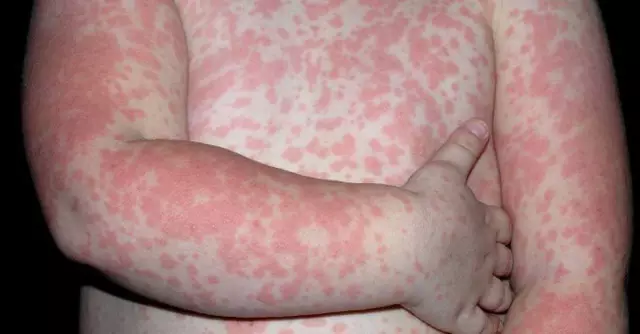- Author Curtis Blomfield blomfield@medicinehelpful.com.
- Public 2023-12-16 20:44.
- Last modified 2025-01-23 17:01.
Allergy to weed pollen is common all over the world today. It is the last wave of pollinosis, which usually occurs at the end of July - beginning of August, when grasses bloom especially rapidly. This dangerous period for allergy sufferers continues until the first snow falls.

The group of allergen plants includes: haze, Compositae, plantain. The allergen is more concentrated in the following plants:
- ambrosia;
- wormwood;
- quinoa.
You need to know that the pollen allergens of these grasses are similar in structure to house dust allergens. It is for this reason that one patient is often allergic to weeds and dust.
Causes of illness
Many herbs that grow in fields and meadows often become dangerous for people predisposed to developing this disease. Fine particles of pollen provoke a negative reaction of the body: in particular, the occurrence of cross-allergy and characteristic symptoms, independent of the actionirritant.
The disease develops rapidly in both adults and children. Sometimes the cause of hypersensitivity in patients prone to allergies to weeds lies in hay fever. This is a genetic predisposition that is inherited. To cure an allergy to weeds is difficult, but possible: for this, the doctor prescribes medication, a special diet, and stimulation of the immune system.

Symptoms of disease
As a rule, they are manifested by problems with the mucous membrane of the nose, respiratory system and eyes. Often, patients complain to allergists about the redness of the eyelids and unbearable itching. Experts advise not to postpone a visit to the doctor when:
- itching of the palate and tongue;
- shortness of breath, debilitating dry cough, shortness of breath;
- runny nose, itching in the nasal cavity, and sometimes nasal congestion, sneezing;
- tearing and redness of the eyes;
- urticaria, skin redness;
- wheezing in the chest;
- fatigue, lethargy, weight loss;
- edema (including Quincke);
- pharyngitis.
The first symptoms to appear are in the respiratory tract. Feeling much worse in windy weather, when pollen spreads faster due to gusts of wind. Patients experience relief when it rains, when the pollen is nailed to the ground.

Weed Allergy Treatment
In therapy, variousantiallergic drugs, the action of which is aimed at suppressing and eliminating an allergic reaction. The first recommendation that a patient with an allergy to weeds receives from a doctor is to minimize contact with provocateurs of negative reactions. During the active flowering of plants, you should not go out into nature. In addition, patients are prescribed a strict diet.

Weed allergy medicines are so-called general use antihistamines that do not cause sedation. These include:
- Claritin;
- "Loratadine";
- Histimet;
- Alergodil;
- Zyrtec;
- Lordestin and others.
Fenistil gel will help get rid of itching and skin dermatitis in case of allergies to weeds. To remove toxins, sorbents are recommended - "Smekta", "Enterosgel", white coal. Nasal congestion will be eliminated by vasoconstrictor drugs: Rinazolin, Galazolin, Tizin, Naphthyzin, Xylometazoline.

In complicated cases, after a thorough examination, doctors prescribe hormonal drugs. In the treatment of weed allergy in children, drugs are prescribed taking into account the age of the child.
Immunotherapy
Immunotherapy can help the body reduce sensitivity to weeds. This is a new, but well-proven method, which consists in introducing minimal doses of an irritant into the body in order to reduce and completely eliminate its manifestations.negative reactions. One of these drugs is a mixed weed, including reagents of plantain, ragweed, wormwood, s altwort. Only an allergist can prescribe such treatment, if he deems it appropriate.
When taking drops or tablets for weed allergy, it is necessary to include vitamin complexes in the diet that support the defenses. This is especially important when treating children whose immune system is not yet fully developed and is not ready to fully withstand the negative effects of the environment.
Folk treatments
Traditional healers offer patients and parents whose children are allergic to weeds, an effective recipe for the treatment of this disease. It is necessary to purchase peony root powder at the pharmacy. It should be taken half an hour before meals. For an adult, the daily dosage should not exceed four tablespoons (tablespoons), and for children over ten years old - one spoon. This remedy is effective during allergic rhinitis. If the child cannot take the powder in its pure form, you can add a little jam to it.
Dilute a gram of natural mummy in a liter of milk or warm water, take this composition daily in the morning. Adults should drink 100 ml, and children over four years old should drink 50 ml.
If it is found that ragweed causes allergies, pour one tablespoon (tablespoon) of oak bark with boiling water (250 ml) for two hours. After this, the infusion must be filtered, gauze folded in three layers should be moistened in it, and applied to the site of the localization of the disease for forty minutes. recommended for treatmentallergic dermatitis and urticaria.

Hypoallergenic diets
Along with an allergy to weed pollen, a cross-allergy can develop, which is manifested by a food reaction. It occurs in 95% of cases. Determining the cause of an allergy, especially when several symptoms are combined, is quite difficult. Doctors recommend that patients follow a fairly strict weed allergy diet that excludes many foods.
When the disease worsens
Fasting is recommended for two days - drinking only mineral or drinking water in the amount of not more than one and a half liters per day (one liter for children), weak tea. In the future, the diet is designed for five days. Foods that are very rarely allergens are allowed to be consumed.

During the diet are allowed to use:
- bread:
- wheat and gray bread baked yesterday;
- vegetarian, vegetable, cereal soups;
- buckwheat and oatmeal on the water.
Eat at least six meals a day.
When symptoms improve
When there is a decrease in the symptoms of the disease, patients are allowed to:
- bread gray and wheat yesterday's baking;
- unsweetened and savory biscuits and baked goods;
- soups with vegetable broth, vegetarian, fresh cabbage soup, borscht, lean meat soup, beetroot;
- dishes fromlean beef; veal, poultry baked, stewed or boiled;
- one soft-boiled egg per day, 1 egg omelette or protein;
- yogurt, pasteurized and acidophilic milk, kefir, non-acidic cottage cheese;
- weak milk tea, mineral or drinking water, weak coffee.
Eat at least four meals a day.

What foods should be eliminated from the diet?
You need to know that if you are allergic to weeds, you should not use. From the diet should be excluded:
- bee products;
- mayonnaise;
- chicory;
- sunflower seeds;
- mustard;
- sunflower oil;
- spices and herbs: coriander and dill, celery and cumin, curry and parsley, black pepper and nutmeg, cinnamon and anise, ginger;
- melons;
- alcohol, especially those containing wormwood - balsamic drinks, vermouths.
Negative reactions can cause garlic, carrots, bananas, citrus fruits. If you have an allergy, for example, to quinoa pollen, do not eat spinach and beets. For allergy sufferers, phytopreparations based on the following herbs are categorically contraindicated:
- Chamomile.
- wormwood.
- Cat-and-stepmother.
- Calendula.
- Elecampane.
- Series.
- Tanzy.
- Yarrow.
- Dandelion.
Disease prevention
Doctors recommend that patients who have undergone treatment notneglect disease prevention measures that will avoid the manifestations of the disease during the seasonal flowering of grasses. The main ways to prevent relapse are:
- Restriction of trips to nature during the flowering of meadow and field grasses.
- Wear closed clothes when going for a walk.
- The room should be well ventilated, but cover the window with damp gauze to prevent pollen from entering the room.
- Wet clean regularly.
- Start taking antiallergic drugs a few days before weeds start to bloom.
- Follow a special diet that excludes food allergens.
Do not let the treatment of this disease take its course: if at least one of the above symptoms of allergy appears, visit an allergist who will prescribe an examination, and after receiving its results, an effective treatment.






